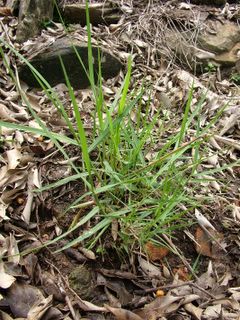Torpedo grass
Scientific name:
Panicum repens
Synonyms: Bullet grass, Couch panicum, Creeping panic, Panic rampant, Quack grass
 Photo courtesy of Fatima Guerra
Photo courtesy of Fatima Guerra
Habitat
Swamps, moist, coastal, and sandy soils
Affected crops
Rice, sugarcane, citrus, and vegetables
Distribution
Worldwide
Description
The stem is rigid, erect or leaning, and grows up to a height of 3 feet. The leaves are grayish-green, narrow, often rolled inward and with hairs on the upper surface. The flower head is branched, open, with white to yellow flowers. The weed is propagated by rhizomes (rootstocks)
which have running tips that are sharp-pointed and torpedo-shaped, hence the name. The rhizomes are creeping structures and their tips and buds are covered with hard, whitish to brownish scales.
Effects and impacts
The weed is very difficult to control once established it affects the yield of rice. It also affects the harvesting operations and the quality of produce. It is, however, good for holding the soil along the riverbanks.
Methods of control
- Use clean seeds
- Make sure that the seedbed is free of weeds
- Proper land preparation
- Keep the surroundings (bunds, levees, irrigation canals) free of weeds
- Hand weeding or hoeing
- Regular field monitoring

